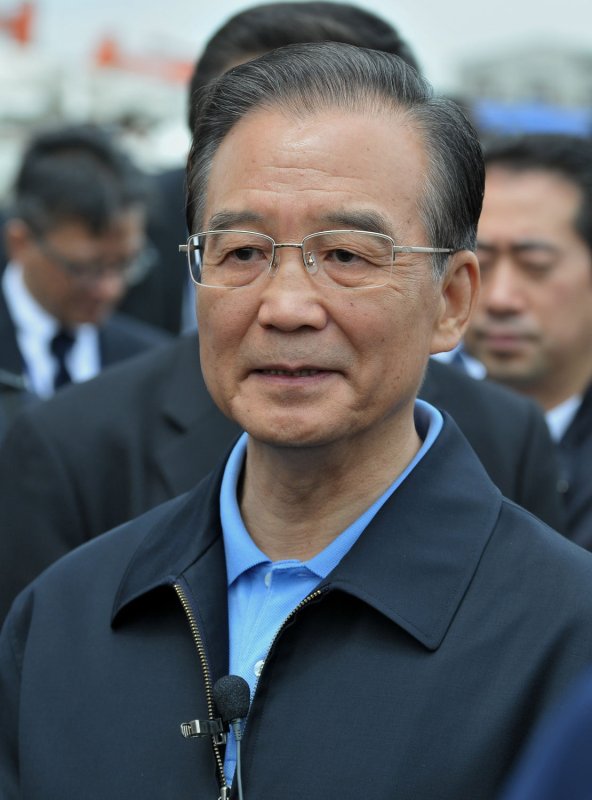Chinese Premier Wen Jiabao on May 21, 2011. UPI/Keizo Mori |
License Photo
SHANGHAI, June 28 (UPI) -- The European charm offensive of Chinese Premier Wen Jiabao has been conducted with characteristic Chinese thoughtfulness and efficiency.
During a visit to the birthplace of the bard in Stratford-upon-Avon, the British were told Shakespeare is the greatest writer of all time. Lots of carefully prepared questions from journalists about human rights and the jailing of artist Ai Weiwei were deflected by his timely release, swiftly followed by the release of AIDS activist Hu Jia.
"There will not be real socialism if there is no real democracy, and there will not be protection of economic and political rights if there is no real freedom," Wen told a meeting at the venerable Royal Society, founded in the 17th century as one of the first great institutions of science in the West, where he received a medal.
The effect of this back home in China was somewhat muted, since the CCN TV news report of the meeting suddenly blacked out at a point when human rights were raised.
Ahead of the Chinese premier's next stop in Germany, Wen said China would play the role of Europe's "friend in need" at this time of crisis for the euro currency.
"When some European countries were hit by the sovereign debt crisis, China has actually increased the purchase of government bonds of some European countries and we have not cut back on our euro holdings," he said. "I think these show our confidence in the economies of the European countries and the eurozone."
A fraction of China's vast savings accounts for some $3 trillion in foreign securities, and currency reserves have been judiciously expended to buy into the Greek port of Piraeus, into investing some $20 billion into 23 British companies including the iconic MG sports car and into buying the bonds of various countries, including Hungary, Wen's first stop.
"Before I came to the U.K., I visited Hungary. We reached agreement on the Chinese government buying a certain amount of government debts of bonds on the Hungarian side," he noted. "That is China lending a helping hand to Hungary at a time when that country is in difficulty. We have done this for Hungary and we will do the same thing for other European countries. I believe the friendship and co-operation between China and European countries are most keenly shown in the times of difficulties so as we often say a friend in need is a friend indeed," he noted.
Forty years after the historic visit of Henry Kissinger to China, a pivotal point in the Cold War in breaking up the once monolithic Communist bloc, China is playing the Kissinger card. He used his visit to take advantage of the Sino-Soviet split to forge a separate Sino-American relationship. Now Wen seems to be exploiting differences between Europe and America with similar aplomb.
It is far from clear that this will succeed. Three years ago, at the time of the Beijing Olympics, the goodwill for what China called its "peaceful rise" was widespread. The World Bank's Robert Zoellick was talking of China as a fellow stakeholder in the global economy, ready to play by the common rules of international commerce and behavior.
That was then. This is now. Surging with self-confidence after navigating the global financial crisis, China has been throwing its weight around in the South China Sea, alarming Vietnam, the Philippines, Indonesia and Brunei with its insistence that the whole sea and its mineral wealth belong to China. Japan has been shaken by some minor clashes over other disputed islands, and India frets over China's apparent plans to start building dams in Tibet near the source of the Brahmaputra River, which supplies about a third of northern India's water.
China's impressive investments in Africa have become controversial, since so many of the jobs in construction are going to imported Chinese workers rather than Africans. China's readiness to do business with unsavory regimes does not go down quite as well in the age of the democratic upsurge of the Arab Spring as it did before.
China's latest clampdown on various dissidents and on the Internet (while also being blamed for many cyberattacks) has caused alarm. The United Nations startled Chinese diplomats with its recent press release expressing concerns over China's "recent wave of enforced disappearances."
Doubtless China will learn from this, even as it navigates the preliminary phases of the transition of power to the next generation of leaders, a process that may help explain the latest crackdown on dissidents, human-rights lawyers and other activists. And doubtless China's astute deployment of its massive wealth to investments and various causes overseas will also pay dividends.
But the fact remains that China may well be influencing people, and it has a highly impressive record of economic management to flaunt, but it is not exactly winning friends. Joseph Nye of Harvard's Kennedy School of Government invented the concept of soft power, as opposed to the hard power of coercion. He defined it as the ability to get other people and countries to want what you want. China has yet to show it understands the distinction. It is in Beijing's own interest -- as well as the world's -- that the Chinese leadership learns this quickly.















